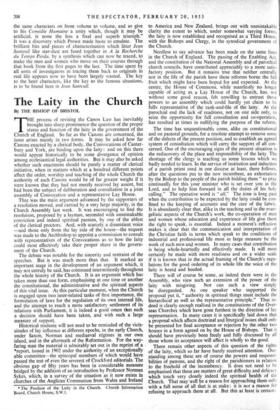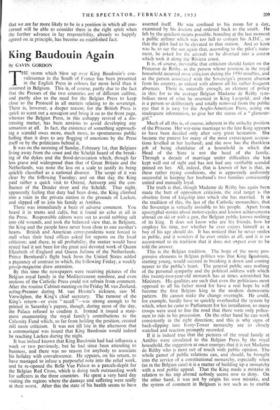The Laity in the Church By THE BISHOP OF BRISTOL
THE process of revising the Canon Law has inevitably brought into sharp prominence the question of the proper status and function of the laity in the government of the Church of England. So far as -the Canons are concerned, the issue arises mainly in two forms. It may be asked how far Canons enacted by a clerical body, the Convocations of Canter- bury and York, are binding upon the laity: and on this there would appear historically to be some divergence Of opinion among ecclesiastical legal authorities. But it may also be asked whether such enactment should be purely a matter of clerical initiative, when in matters which at a hundred different points affect the order, worship and teaching of the whole Church the authority of such Canons would be of far greater weight if it were known that they had not merely received lay assent, but had been the subject of deliberation and consultation in a joint assembly of Convocation and a representative Lay House. That was the main argument advanced by the supporters of a resolution moved, and carried by a very large majority, in the Church Assembly last week. It was encouraging to find the resolution, proposed by a layman, seconded with unmistakable conviction and indeed spiritual passion, by one of the ablest of the clerical proctors. And, with scarcely a dissentient voice —and those only from the lay side of the house—the request was made to the Archbishop to appoint a commission to consult with representatives of the Convocations as to how the laity could most effectively take their proper share in the govern- ment of the Church.
The debate was notable for the sincerity and restraint of the speeches. But it was much more than that. It marked an important stage in the development of an argument which, it may not untruly be said, has continued intermittently throughout the whole history of the Church. It is an argument which has taken more than one form, emphasising at one time or another the constitutional, the administrative and the spiritual aspects of this vital issue. At this particular moment, when the Church is engaged upon two inter-related tasks of first importance, the formulation of laws for the regulation of its own internal life, and the attempt to reach a more satisfactory settlement of its relations with Parliament, it is indeed a good omen that such a decision should have been taken, and with such a large measure of support. Historical students will not need to be reminded of the vicis- situdes of lay influence at different epochs, in the early Church, under Saxon, Norman and mediaeval regimes in our own island, and in the aftermath of the Reformation. For the way- faring man the material is admirably set out in the reprint of a *report, issued in 1902 under the authority of an exceptionally able committee—the episcopal members of which would have passed the test of even the severest of Crockford editorials. The obvious gap of fifty years has been in considerable measure bridged by the addition of an introduction by Professor Norman Sykes, which, in a survey of the situation as it now exists in churches of the Anglican Communion from Wales and Ireland
• • The Position of the Laity in the Church. Church Information Board, Church House, S.W.I.
to America and New Zealand, brings out with unmistakable clarity the extent to which, under somewhat varying forms, the laity is now established and recognised as a Third House, with the Bishops and Clergy, in the synodical government of the Church.
Needless to say advance has been made on the same lines in the Church of England. The passing of the Enabling Act, and the constitution of the National Assembly and of parochial church councils, have contributed appreciably to a more satis- factory position. But it remains true that neither centrally nor in the life of the parish have these reforms borne the full fruit which might have been hoped for and expected. At the centre, the House of Commons, while manifestly no longer capable of acting as, a Lay House of the Church, has, not without some good reason, felt unwilling to entrust those powers to an assembly which could hardly yet claim to be fully representative of the rank-and-file of the laity. At the parochial end the lack of readiness, not on One side only, to seize the opportunity for full consultation and co-operation, has resulted at times in nullifying the purpose of the reform.
The time has unquestionably come, alike on constitutional and on pastoral grounds, for a resolute attempt to remove some of the defects of the present position, and to establish an agreed system of consultation which will carry the support of all con- cerned. One of the encouraging signs of the present situation is the rediscovery of the place and responsibility of the laity. The shortage of the clergy is teaching us some lessons which we badly needed to learn. In the service of institution and induction of a parish priest used in one diocese at least, there follows, after the questions put to the new incumbent, an exhortation by the Bishop to the people of the parish bidding them " to pray continually for this your minister who is set over you in the Lord, and to help him forward in all the duties of his holy calling." The operative word is "all." The _time is long past when the contribution to be expected by the laity could be con- fined to the keeping of accounts and the care of the fabric. It is abundantly clear that, alike in the teaching and in the evan- gelistic aspects of the Church's work, the to-operation of men and women whose education and experience of life give them the right to speak, is essential. Indeed a moment's reflection makes it clear that the communication and interpretation of the Christian faith in terms which speak to the conditions of industrial and professional life must in large measure be the work of such men and women. In many cases that contribution is being whole-heartedly and effectively made. It will most certainly be made with more readiness and on a wider scale if it is known that in the actual framing of the Church's regu- lations for the good ordering of its whole life the voice of the laity is heard and heeded.
There will of course be some, as indeed there were in the Assembly, who view such an extension of the power of the laity with misgiving. Nor can such a view simply be disregarded. As one speaker who supported the proposal put it, "authority in spiritual things must include the hierarchical as well as the representative principle." That in- deed is clearly enough realised in the constitutions of the Over- seas Churches which have gone furthest in the direction of lay representation. • In many cases it is specifically laid down that a proposal which affects doctrinal and liturgical issues shall only be presented for final acceptance or rejection by the other two houses in a form agreed on by the House of Bishops. That it should have previously been freely and fully discussed by all those whom its acceptance will affect is wholly to the good.
There remain other aspects of this question of the rights of the laity, which so far have barely received attention. Out- standing among these are of course the powers and responsi- bilities of patrons, and the right of the parishioners in relation to the freehold of the incumbency. It does not need to be emphasised that these are matters of great difficulty_ and delicacy which touch very closely indeed the spiritual health of the Church. That may well be a reason for approaching them only with a full sense of all that is at stake: it is- not a reason for refusing to approach them at all. But this at least is certain : that we are far more likely to be in a position in which all con- cerned will be able to consider them in the right spirit when the further advance in lay responsibility, already so happily agreed on in principle, has become an established fact.



































 Previous page
Previous page